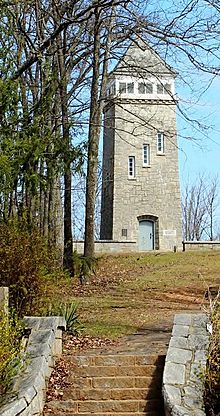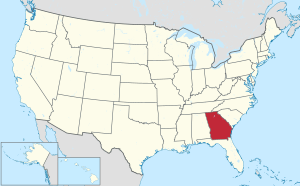Habersham County, Georgia facts for kids
Quick facts for kids
Habersham County
|
||
|---|---|---|

Fire Tower on Chenocetah Mountain.
|
||
|
||

Location within the U.S. state of Georgia
|
||
 Georgia's location within the U.S. |
||
| Country | ||
| State | ||
| Founded | 1818 | |
| Named for | Joseph Habersham | |
| Seat | Clarkesville | |
| Largest city | Cornelia | |
| Area | ||
| • Total | 279 sq mi (720 km2) | |
| • Land | 277 sq mi (720 km2) | |
| • Water | 2.3 sq mi (6 km2) 0.8%% | |
| Population
(2020)
|
||
| • Total | 46,031 | |
| • Density | 166/sq mi (64/km2) | |
| Time zone | UTC−5 (Eastern) | |
| • Summer (DST) | UTC−4 (EDT) | |
| Congressional district | 9th | |
Habersham County is a county in the Northeast region of the U.S. state of Georgia. As of the 2020 census, the population was 46,031. The county seat is Clarkesville. The county was created on December 15, 1818, and named for Colonel Joseph Habersham of the Continental Army in the Revolutionary War.
Habersham County comprises the Cornelia, GA Micropolitan Statistical Area.
Contents
Geography
According to the U.S. Census Bureau, the county has a total area of 279 square miles (720 km2), of which 277 square miles (720 km2) is land and 2.3 square miles (6.0 km2) (0.8%) is water. The county is located within the Blue Ridge Mountains, a segment of the Appalachian Mountains. The county also includes part of the Chattahoochee National Forest.
The highest point in the county is a 4,400-foot (1,300 m) knob less than 700 feet (210 m) southeast of the top of Tray Mountain, the seventh-highest mountain in Georgia. Habersham shares this portion of Tray Mountain, just 30 vertical feet shy of the peak's 4,430-foot summit, with White County to the west and Towns County to the north. 2.4 miles to the northeast of Tray Mountain is Young Lick (elevation 3,809 feet (1,161 m)). The Appalachian Trail runs along the top of the high ridge between Young Lick and Tray, a part of the Blue Ridge Mountain crest.
Habersham is mostly located in the Upper Chattahoochee River sub-basin of the ACF River Basin (Apalachicola-Chattahoochee-Flint River Basin), with the northeastern corner of the county located in the Tugaloo River sub-basin in the larger Savannah River basin, and the southeastern portion located in the Broad River sub-basin of the same Savannah River basin.
The Chattahoochee River rises in what used to be Habersham County, as portrayed in Sidney Lanier's poem "Song of the Chattahoochee":
- Out of the hills of Habersham,
- Down the valleys of Hall,
- I hurry amain to reach the plain,
- Run the rapid and leap the fall,
- Split at the rock and together again.
The county, originally comprising much of Northeast Georgia, was cut up dramatically in the latter half of the 19th century and the first years of the 20th century; as population increased in the area, new counties were organized from it and borders were changed. In 1857, its most western part was added to Lumpkin County, which had been created in 1832. That same year, the area east of Lumpkin and west of present-day Habersham became White County. In 1859, Banks County was carved from Habersham's southernmost territory. Finally, in 1905, Stephens County was formed from parts of Habersham and Banks.
Major highways
 U.S. Route 23
U.S. Route 23 U.S. Route 123
U.S. Route 123 U.S. Route 441
U.S. Route 441
 U.S. Route 441 Business (west of Toccoa)
U.S. Route 441 Business (west of Toccoa) State Route 15
State Route 15 State Route 15 Connector
State Route 15 Connector State Route 15 Loop
State Route 15 Loop State Route 17
State Route 17 State Route 17 Alternate
State Route 17 Alternate State Route 105
State Route 105 State Route 115
State Route 115 State Route 197
State Route 197 State Route 197 Connector
State Route 197 Connector State Route 255
State Route 255 State Route 255 Alternate
State Route 255 Alternate State Route 356
State Route 356 State Route 365
State Route 365 State Route 384
State Route 384 State Route 385
State Route 385
Adjacent counties
- Rabun County - north
- Oconee County, South Carolina - east
- Stephens County - east
- Banks County - south
- Hall County - southwest
- White County - west
- Towns County - northwest
Education
All of Habersham County is served by the Habersham County School District.
The Tallulah Falls School is located in Tallulah Falls. Piedmont University and North Georgia Technical College are also located in Habersham county.
Demographics
| Historical population | |||
|---|---|---|---|
| Census | Pop. | %± | |
| 1820 | 3,145 | — | |
| 1830 | 10,671 | 239.3% | |
| 1840 | 7,961 | −25.4% | |
| 1850 | 8,895 | 11.7% | |
| 1860 | 5,966 | −32.9% | |
| 1870 | 6,322 | 6.0% | |
| 1880 | 8,718 | 37.9% | |
| 1890 | 11,573 | 32.7% | |
| 1900 | 13,604 | 17.5% | |
| 1910 | 10,134 | −25.5% | |
| 1920 | 10,730 | 5.9% | |
| 1930 | 12,748 | 18.8% | |
| 1940 | 14,771 | 15.9% | |
| 1950 | 16,553 | 12.1% | |
| 1960 | 18,116 | 9.4% | |
| 1970 | 20,691 | 14.2% | |
| 1980 | 25,020 | 20.9% | |
| 1990 | 27,621 | 10.4% | |
| 2000 | 35,902 | 30.0% | |
| 2010 | 43,041 | 19.9% | |
| 2020 | 46,031 | 6.9% | |
| 2023 (est.) | 48,757 | 13.3% | |
| U.S. Decennial Census 1790-1880 1890-1910 1920-1930 1930-1940 1940-1950 1960-1980 1980-2000 2010 2020 |
|||
2020 census
| Race / Ethnicity (NH = Non-Hispanic) | Pop 2000 | Pop 2010 | Pop 2020 | % 2000 | % 2010 | % 2020 |
|---|---|---|---|---|---|---|
| White alone (NH) | 30,486 | 34,621 | 34,694 | 84.91% | 80.44% | 75.37% |
| Black or African American alone (NH) | 1,551 | 1,412 | 1,722 | 4.32% | 3.28% | 3.74% |
| Native American or Alaska Native alone (NH) | 89 | 81 | 83 | 0.25% | 0.19% | 0.18% |
| Asian alone (NH) | 664 | 955 | 990 | 1.85% | 2.22% | 2.15% |
| Native Hawaiian or Pacific Islander alone (NH) | 30 | 47 | 35 | 0.08% | 0.11% | 0.08% |
| Other race alone (NH) | 5 | 34 | 109 | 0.01% | 0.08% | 0.24% |
| Mixed race or Multiracial (NH) | 327 | 558 | 1,518 | 0.91% | 1.30% | 3.30% |
| Hispanic or Latino (any race) | 2,750 | 5,333 | 6,880 | 7.66% | 12.39% | 14.95% |
| Total | 35,902 | 43,041 | 46,031 | 100.00% | 100.00% | 100.00% |
As of the 2020 United States Census, there were 46,031 people, 15,139 households, and 10,440 families residing in the county.
2010 census
As of the 2010 United States census, there were 43,041 people, 15,472 households, and 11,307 families living in the county. The population density was 155.5 inhabitants per square mile (60.0/km2). There were 18,146 housing units at an average density of 65.6 units per square mile (25.3 units/km2). The racial makeup of the county was 85.7% white, 3.4% black or African American, 2.2% Asian, 0.5% American Indian, 0.2% Pacific islander, 6.3% from other races, and 1.8% from two or more races. Those of Hispanic or Latino origin made up 12.4% of the population. In terms of ancestry, 15.6% were English, 13.9% were Irish, 13.7% were American, and 9.9% were German.
Of the 15,472 households, 34.4% had children under the age of 18 living with them, 57.8% were married couples living together, 10.5% had a female householder with no husband present, 26.9% were non-families, and 23.2% of all households were made up of individuals. The average household size was 2.63 and the average family size was 3.08. The median age was 38.6 years.
The median income for a household in the county was $40,192 and the median income for a family was $49,182. Males had a median income of $35,974 versus $27,971 for females. The per capita income for the county was $19,286. About 15.7% of families and 19.6% of the population were below the poverty line, including 31.2% of those under age 18 and 12.5% of those age 65 or over.
Prison
The Georgia Department of Corrections operates the Arrendale State Prison in an unincorporated area in the county, near Alto.
Lee Arrendale State Prison was built in 1926. The prison was named after Lee Arrendale, former chairman of the Georgia Board of Corrections, after he and his wife were killed in a plane crash. The facility was originally constructed as a tuberculosis (TB) hospital, when treatment consisted primarily of rest in sanatoriums. It operated until the mid-1950s; with antibiotics, TB was better controlled and such hospitals were no longer needed. The facility was transferred to the Georgia Prison system.
Once acquired by the Georgia Department of Corrections, it was first used to house youthful offenders from ages 18–25. Over a short amount of time, Lee Arrendale prison gained a bad reputation as the second most violent all-male prison in the state. In 2005, however the Department of Corrections decided to make the prison an exclusive general purpose women's prison. As a result of the prison's past troubles and reputation for violence, the state decided to make this change to improve the prison's status in the state. In March 2006, the prison took in 350 women prisoners from Georgia's overflowing jail system to start this process.
Lee Arrendale is also home to the United States' first all-female fire department and the state's first inmate fire department,, thanks to the Georgia Department of Corrections' (GDC) Fire Services Division. The GDC operates many fire departments throughout the state, staffed solely by inmates, who are supervised by GDC employees. Such inmates are trained as certified officers but as professional firefighters. The inmate firefighter program provides fire protection to the largely rural communities without local or volunteer fire departments near the prisons, as well as to other locations in Georgia during emergencies. Inmates are trained and certified in accordance with Georgia law and the Georgia Firefighter Standards and Training Council, as with any regular fire department. In 2007, inmate fire squads responded to the wildfires in South Georgia near Waycross, Georgia, in addition to the hundreds of other alarms they received statewide.
Communities
Cities
Census-designated place
Unincorporated communities
- Batesville
- Habersham Mills
- Hollywood
- Turnerville
See also
 In Spanish: Condado de Habersham para niños
In Spanish: Condado de Habersham para niños



